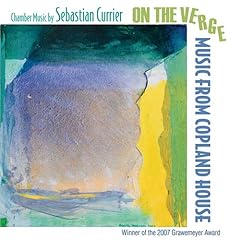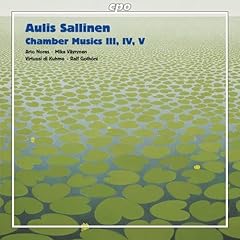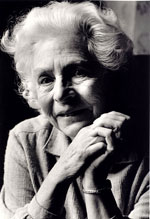 On the Verge
On the Verge
Chamber Music by Sebastian Currier
Music From Copland House
Koch International
With last year’s magnificent New World release Quartetset and this equally outstanding recording of four fairly recent chamber pieces (including the Grawemeyer-awarding winning Static), Sebastian Currier has elbowed himself into the honorary “little music” seat at the big table where the Glasses, Adamses, and Reichs go to chew the fat. So he’s a minaturist, but would Vermeer have been Vermeer on a Frank Stella-sized canvas?
Currier is something of a music jokester, with performance directions like “almost too fast,” “almost too much,” “almost too little” and “bipolar” but it is his uncanny ability to re-imagine music you think you’ve heard before that most frequently draws a smile and a sense of good companionship. Nobody since Stravinsky has done it better.
 Debut
Debut
Lowell Libermann
Trio Fedele
Artek
There is more than hint of powered wigs and petticoats in Lowell Libermann’s gracious, stately chamber music for ladies and gentlemen of quality. No 20th century angst here. Dvořák sounds like a wild man by comparison. The flute, cello and piano pieces are pleasant enough and expertly played by the Trio Fedele but I couldn’t help imagining a live performance where Borat would wander in with a plastic bag filled with poop and ask the cello player what to do with it.
 Chamber Musics III, IV, V
Chamber Musics III, IV, V
Aulis Sallinen
Virtuosi de Khlmo
CPO
Another music jokester but more in the William Bolcom tradition, relentlessly tonal and melodic, drawing mirth and drama out of genre references to tango and jazz. Easy listening? Sure. Nobody writing “classical” music today writes better hooks. That’s not necessarily a criticism in my book.

 Katharine is a British-born composer, sound artist and writer, currently living about as far out West as you can get on Pender Island in BC, Canada. Prior to this “slightly alarming” (her words) change of direction she was Director of the Electronic Music Studios at Goldsmiths, University of London. She now supports the composing habit by freelance writing and some teaching. She’s composed instrumental music, music combining instruments or voices and digital media, and purely electronic work. Her music makes frequent use of documentary sound – conversation, city sounds, birds etc. – in a way that perhaps invites new appreciation both of the ‘real world’ and of the concert hall. Increasingly, she writes about music, in particular electroacoustic and electronic music. Her book of experimental writings on recent electronic music (of many kinds and approaches) entitled Sounding Art: Eight Literary Excursions through Electronic Music was published by Ashgate in 2004.
Katharine is a British-born composer, sound artist and writer, currently living about as far out West as you can get on Pender Island in BC, Canada. Prior to this “slightly alarming” (her words) change of direction she was Director of the Electronic Music Studios at Goldsmiths, University of London. She now supports the composing habit by freelance writing and some teaching. She’s composed instrumental music, music combining instruments or voices and digital media, and purely electronic work. Her music makes frequent use of documentary sound – conversation, city sounds, birds etc. – in a way that perhaps invites new appreciation both of the ‘real world’ and of the concert hall. Increasingly, she writes about music, in particular electroacoustic and electronic music. Her book of experimental writings on recent electronic music (of many kinds and approaches) entitled Sounding Art: Eight Literary Excursions through Electronic Music was published by Ashgate in 2004. Ryan is a San Francisco-based composer and performer, most frequently combining the two in the “rock chamber ensemble”
Ryan is a San Francisco-based composer and performer, most frequently combining the two in the “rock chamber ensemble”  Consider this:
Consider this:  I caught the second of “In Your Ear Redux” concerts at Zankel Hall with The Tensions Mountain Boys Saturday night, and I was happy I did!
I caught the second of “In Your Ear Redux” concerts at Zankel Hall with The Tensions Mountain Boys Saturday night, and I was happy I did! Why a String Quartet? What is it that has given it its exalted reputation and mystique? Why have so many composers regarded it as the perfect medium of expression, though it is perhaps the most demanding to write for? And why do distinguished artists often prefer to work as a team in a first class quartet rather than make bigger money as, say, orchestral leaders? Music means different things to different people: but for those to who music is an intellectual art, a balanced and reasoned statement of ideas, an impassioned argument, an intense but disciplined expression of emotion – the string quartet is perhaps the most satisfying medium of all.
Why a String Quartet? What is it that has given it its exalted reputation and mystique? Why have so many composers regarded it as the perfect medium of expression, though it is perhaps the most demanding to write for? And why do distinguished artists often prefer to work as a team in a first class quartet rather than make bigger money as, say, orchestral leaders? Music means different things to different people: but for those to who music is an intellectual art, a balanced and reasoned statement of ideas, an impassioned argument, an intense but disciplined expression of emotion – the string quartet is perhaps the most satisfying medium of all.